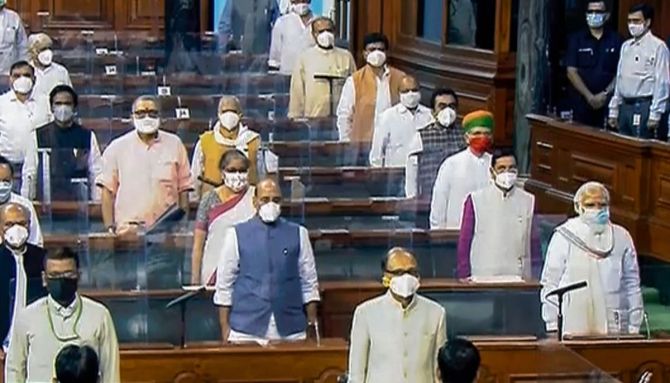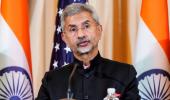India-China relations have always attracted Parliament's attention and there have always been useful and constructive discussions as how to engage with China, notes Rup Narayan Das.

The demand for a discussion on India-China relations, particularly on the situation in the Line of Actual Control continues and the government is obliged to take a call on the Opposition's demand.
Prime Minister Narendra Damodardas Modi had briefed Opposition leaders on the situation at the LAC.
Opposition parties, particularly the Congress and its leader Rahul Gandhi have been demanding more clarity on Prime Minister Modi's articulation.
This is nothing more than hair-splitting.
When the country is faced with a real threat to its territorial integrity and national sovereignty, there is nothing more sacrosanct than a firm resolve to face the threat.
There was also some mention in the political spectrum that the PMO has not spoken on the issue and the adversary has not been mentioned by name.
It is an established diplomatic norm not to name a country by a head of State or government in adversarial relations.
That doesn't help any way, rather belittles the dignity and stature of the high office.
When actions are louder than words, where is the need for words?
The fact that the situation at the LAC has not spiralled into war or even a limited war is precisely due to India's advance defence preparedness, combat-readiness, meticulous troops deployment, punitive economic measures including banning certain Chinese apps and putting restrictions on Chinese FDI in certain sectors, diplomatic mobilisation, military and diplomatic dialogue and finally boosting the morale of defence personnel.
A multi-pronged strategy has not only prevented China from further advancement, but has also put India in an advantageous position on the border.
A war, even if a limited one, is in nobody's interest -- neither India's nor China's.
It is always better to win a war without fighting one.
A major factor which has presumably deterred Chinese adventurism is the speedy beefing up of India's combat capability which was neglected over the years in spite of the persistent security dilemma emanating from India's northern neighbour and the neglect of the construction of sensitive broader roads so essential for India's country's security.
India completed the 225 kilometre strategic Dabruk-Shyok-Daulat Beg Oldie Road in the LAC in the Galwan Valley area, the site of the June 15 clash between the two armies, in July this year notwithstanding the tense situation prevalent in the border.
This is something unprecedented in the Border Road Organisation's history.
The strategic road will greatly facilitate troop movement to the forward areas very fast.
Defence Minister Rajnath Singh's visit in June to Russia to participate in the Victory Day parade was a smart diplomatic move, which not only fast tracked the purchase of the fighter jets , but also in acquainting Moscow India's tested and trusted ally and securing Russia's support for facing the challenge across India's border.
Amid the tension on the border, the Defence Acquisition Council approved deals worth Rs 38,900 crore (Rs 389 billion).
This included procurement of 21 MiG-29 fighter jets, upgrading of 59 of them and acquisition of 12 Su-30MKI aircrafts for the Indian Air Force.
While both deals were in the pipeline for some time the approval came a week after the defence minister's visit to Russia to grace the Victory Day parade.
The acquisition and induction of the 'game changer' Rafale aircraft from France was a loud message to the adversary.
France was also co-opted with the strategic edifice of the Indo-Pacific, a riposte to China's foray into the Indian Ocean.
Similarly, the acquisition of strategic assets such as the Apache and Chinook helicopters from the US has added sinews to the defence capability of the air force in the very difficult terrain of the India-China border.
While Prime Minister Modi reached out to world leaders including US President J Trump and Russian President Vladmir Putin, Defence Minister Rajnath Singh, National Security Adviser Ajit Kumar Doval and External Affairs Minister Dr Subrahmanyam Jaishankar exerted all efforts to prevail up on their counterparts to explain India's stance and position in no uncertain words.
India's exposition in all these diplomatic engagements was firm and yet dignified.
The unequivocal support of democratic countries particularly USA also produced the desired effect on China.
Although India is fighting its own battle, the fact remains China at this point of time is isolated because of its belligerence.
Overtures from China to reset ties with India are discernable.
The return of the five persons from Arunachal Pradesh by the Chinese army is suggestive of its overtures.
Secondly, Beijing in a very clear message mourned the passing away of former President Pranab Mukherjee.
The late President in his capacity as external affairs minister, defence minister and President had dealt with China very deftly. He visited China in May 2016 towards the end of his Presidential tenure.
In yet another subtle message, Beijing reported to unveil a bronze statue of the legendary Dr Dwarkanath Kotnis who is held in high esteem in China for his yeoman service during the Sino-Japanese war in 1938.
These overtures from China should not be taken as mere optic deception, but also as overtures.
Any discussion in Parliament should take into account these developments.
Discussion and parleys with China has to be from a position of strength.
Parliament is the highest forum and discussion there has to be dignified and the message has to be clear.
India-China relations have always attracted Parliament's attention and there have always been useful and productive and constructive discussions as how to engage with China.
It has to be borne in mind that one can't choose one's neighbour.
Members of Parliament have already been briefed by the Standing Committees on Defence and External Affairs and if need be, there can be more such meetings including the respective consultative committees of Parliament which are held in camera.
The discussions in the House have to be nuanced and constructive.
National interest should be the top-most priority, and not political point scoring.
Rup Narayan Das, PhD, is a China scholar and currently a senior fellow at the Indian Council of Social Science Research at the Indian Institute of Public Administration, New Delhi.
Feature Presentation: Aslam Hunani/Rediff.com










